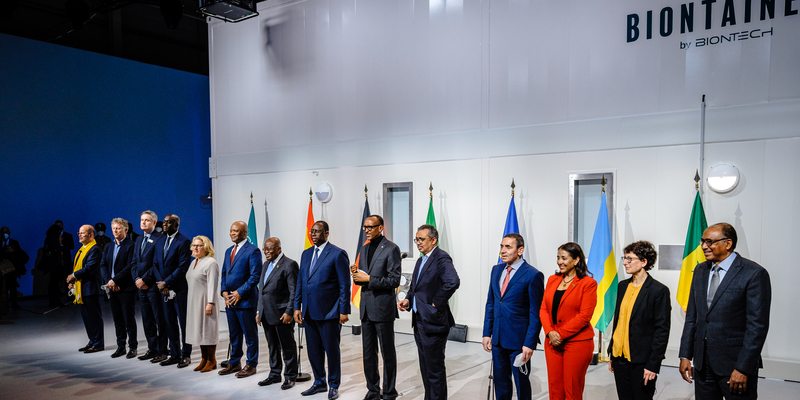BioNTech has moved to improve vaccine supply in Africa. The company has introduced its approach to establishing scalable vaccine production by developing and delivering turnkey mRNA manufacturing facilities based on a container solution.
At a high-level meeting at BioNTech's new manufacturing facility in Marburg and at the invitation of kENUP Foundation, the company presented the container solution named "BioNTainer" to key partners.
Attendees included the political leaders of Senegal, Ghana, and Rwanda, as well as the Director-General of the WHO and top subject matter experts and decision-makers from Africa and Germany.
The first BioNTainer is expected to arrive in Africa in the second half of 2022
Together with BioNTech's Co-Founders Ugur Sahin (CEO), Özlem Türeci (CMO), and Sierk Poetting (COO), they jointly discussed the infrastructure, regulatory and technological requirements to establish an end-to-end manufacturing network for mRNA-based vaccines in Africa.
Macky Sall, President of the Republic of Senegal and President of the African Union, said: "This visit to Marburg is another important milestone in Senegal's target to deliver end-to-end vaccine manufacturing in Africa and for Africa, leveraging the infrastructure and technical capabilities of the Institut Pasteur de Dakar's Madiba project. We are looking forward to working with BioNTech to install the modular production system for mRNA vaccine manufacturing in Dakar in the coming months."
The solution
The manufacturing solution consists of one drug substance and one formulation module, each called a BioNTainer. Each module is built of six ISO sized containers (2.6m x 2.4m x 12m). This allows for mRNA vaccine production in bulk (mRNA manufacturing and formulation), while fill-and-finish will be taken over by local partners.
The capacity can be scaled up by adding further modules and sites to the manufacturing network on the African continent
Each BioNTainer is a cleanroom that BioNTech equips with state-of-the-art manufacturing solutions. Together, two modules require 800 sqm of space and offer an estimated initial capacity of for example up to 50 million doses of the Pfizer-BioNTech COVID-19 vaccine each year.
The BioNTainer will be equipped to manufacture a range of mRNA-based vaccines targeted to the needs of the African Union member states. For example, the Pfizer-BioNTech COVID-19 vaccine and BioNTech's investigational malaria and tuberculosis vaccines, if they are successfully developed, approved or authorized by regulatory authorities.
The capacity can be scaled up by adding further modules and sites to the manufacturing network on the African continent. One of the most critical parts of the manufacturing process is quality control, which includes all necessary tests for each finished vaccine batch. In partnership with local quality control testing labs, BioNTech will help to ensure the identity, composition, strength, purity, absence of product- and process-related impurities, as well as the absence of microbiological contamination of each produced batch.

Paul Kagame, President of the Republic of Rwanda, said: "BioNTech's innovative modular production system opens up a new horizon for global vaccine equity. Rwanda looks forward to initiating mRNA vaccine manufacturing in the near future, in collaboration with BioNTech and our partners in Africa, Europe, and beyond."
The container in action
The establishment of the first mRNA manufacturing facility by BioNTech in the African Union is expected to start in mid-2022. The first BioNTainer is expected to arrive in Africa in the second half of 2022. Manufacturing in the first BioNTainer is planned to commence approximately 12 months after the delivery of the modules to its final location in Africa.
BioNTech expects to ship BioNTainers to Rwanda, Senegal and potentially South Africa in close coordination with the respective country and the African Union. BioNTech will be responsible for the delivery and installation of the modules, while local organisations, authorities and governments will ensure the needed infrastructure. Partners in Ghana and South Africa could support the manufacturing with fill-and-finish capacities.
BioNTech will work closely with local authorities to ensure compliance to relevant regulatory procedures of the national regulatory agencies in each partner country, and also coordinate where appropriate with relevant continental and international agencies, including WHO, Africa CDC, the African Medicines Agency (AMA), and the African Union Development Agency (AUDA-NEPAD).
BioNTech will initially staff and operate the facilities to support the safe and rapid initiation of the production of mRNA-based vaccine doses under stringent good manufacturing processes (GMP) to prepare for the transfer of know-how to local partners to enable independent operation. Vaccines manufactured in these facilities are expected to be dedicated to domestic use and export to other member states of the African Union at a not-for-profit price.
